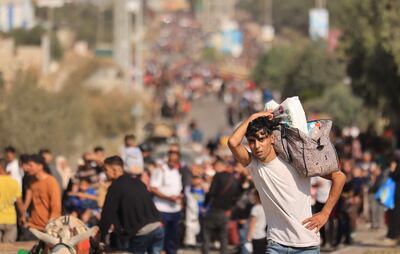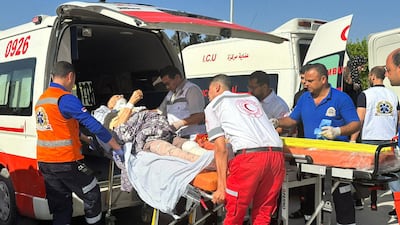Live updates: Follow the latest news on Israel-Gaza
With shadow operators, former intelligence agents, conflict negotiators and risk-assessment teams on the ground, private security firms are assembling their best resources to help evacuate people trapped in the Israel-Gaza war.
Many companies are hiring private operators to ensure the safe movement of their employees across and within the borders of Israel, Gaza and Lebanon as aerial bombings, urban warfare, cross-border missile attacks and border closures are escalating the decades-long conflict.
Iran-allied Hezbollah in Lebanon and Houthis in Yemen have also been striking Israeli targets, fuelling fears of a spillover of violence to the wider region and heightening security risks.
International SOS, a security and risk management company with operations in more than 90 countries, said it has helped enable the movement of at least 200 people around the region, as well as assisting “hundreds more” with information and advice on safety.
Sally Llewellyn, global security director of International SOS, told The National the company has supported a number of safe movements out of the occupied West Bank, which has been a flashpoint of violence between the Israeli citizens and Palestinians since the beginning of the conflict.
“Since the start of the conflict, we have done 11 different missions to help people leave the country by flying out of the Ben Gurion Airport in Israel,” she said.
That includes people from a range of nationalities – Palestinian, Israeli, dual nationals, foreign citizens and also people with medical conditions.
“They were extremely difficult to do given that movement in and out of West Bank is highly restricted,” she said.

The majority of International SOS’s clients are corporates, aid providers and media companies which have operations in the region.
The October 7 Hamas attack on Israel, the following retaliatory assault on Gaza and a war now in its second month without a ceasefire, has caused one of the biggest civilian death tolls in the decades-long Israeli-Palestinian conflict.
About 1,400 Israelis were killed by Hamas, while the death toll in Gaza has crossed 10,500.
The scale of Hamas's attack followed by the full-blown Israeli military bombardment has raised the possibility of a wider regional conflict, prompting many countries to issue warnings to citizens to leave Lebanon, Israel and Palestine.
Several commercial airlines have responded to the crisis by suspending flights, leaving people who stayed behind or could not leave with very few options.
Regular risk assessment
The sudden shift in the security landscape in the region caught many by surprise. But Ms Llewellyn said they were prepared as they continuously monitor security situations around the world and routinely plan for crisis control.
“We had sent a team on the ground in Israeli and Palestinian territories back in July to assess the situation and reaffirm our capabilities, as well as our review of our existing partnerships with our security partners on the ground,” she said.
So, when the situation escalated after October 7, International SOS and its partners on the ground were armed with crucial information that helped evacuate their clients through air and by sea.
“When a lot of commercial aviation options became restricted, we were able to offer chartered flights, as well as work on maritime options,” said Ms Llewellyn.
For land movements within the borders, the firm counted on security and risk-assessment teams on the ground to advise on which routes to take and which checkpoints to cross, especially in the West Bank.
Many security firms team up with private security personnel on the ground that have a thorough understanding of the security landscape of a particular country.
“Private security is a common sort of industry in these types of environments,“ said Ms Llewellyn. "And they could employ a whole range of types of personnel with different backgrounds."
Many are war veterans with previous experience of working in hostile environments.
Previously, several companies hired private security firms to evacuate their employees out of Afghanistan, Sudan and Ukraine. Companies such as International SOS and Control Risks were involved in facilitating the safe movement of people across the border to Europe from Ukraine, and to Port Sudan during the height of the civil war in Sudan.
'Gaza the most challenging environment'
But Gaza is a different ball game and poses an extremely challenging environment for security firms as borders are crossed and movement by road is risky.
Rafah crossing under Egypt’s control, the only exit point for Palestinians trapped in Gaza where an Israeli siege has left its 2.3 million people without food, water and fuel, remains closed, with limited access for aid flow.
Though intense diplomatic efforts recently have seen a few foreign nationalities and people with medical conditions cross into Egypt, thousands including American citizens are still trapped in the war-ravaged Gaza Strip.
Simon Margrave, a partner with Control Risks, a crisis and security consulting company with global operations told The National it has been offering advice to clients in Gaza.
“We have been speaking to clients, who have people in Gaza, on what are the best options they have to keep themselves safe.”
Mr Margrave said the company was offering logistical assistance and advising on the type of provisions to stock up on, for instance candles, batteries or baby formula.
partner at Control Risks
Taking the land journey to the Rafah crossing has been one of the biggest challenges for civilians as it involves dodging Israeli air strikes and bullets.
Mr Margrave is advising clients on safe shelter options such as staying in lower floors of hardened structures and keeping a "grab bag" ready for a move.
“It is a highly volatile and challenging environment,” he said. "We are working with our partners to offer daily risk assessment and advising on all window of opportunities available for our clients, including which government agencies to co-ordinate with, be it in Gaza, Israel or Lebanon.
For those people who are able to cross over to Egypt, security firms are offering logistical and medical assistance, as well as psychological support, which is needed in many cases. Lodgings and tickets are also offered depending on where the next destination or stopover is.












